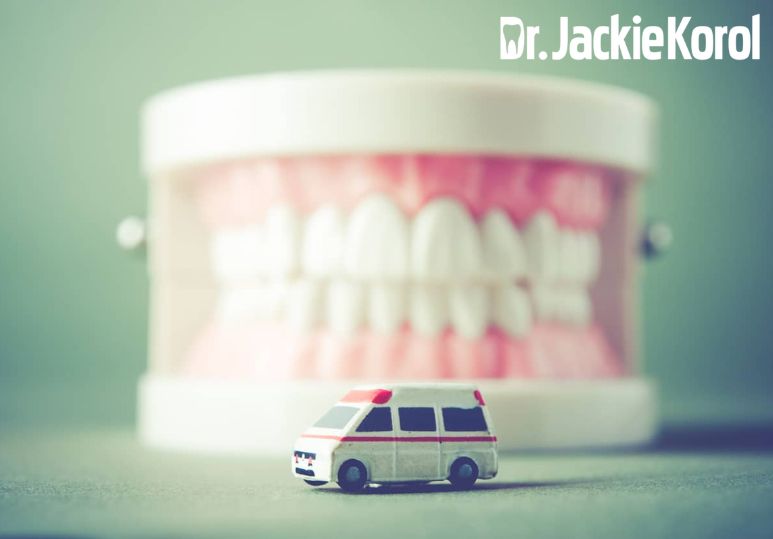Emergency Dentistry: What Is Dry Socket?

Tooth extractions and wisdom teeth removal are standard dental procedures. The dentists at your dental clinic probably perform hundreds if not thousands of these each year. Most often recovery after a pulled tooth is unremarkable. You will likely have some tenderness, swelling, and sensitivity, maybe some minor bleeding, and within a couple of days, you will typically be eating and speaking as normal. But sometimes after a tooth extraction, you could experience complications requiring emergency dentistry. Dry socket is one of the most common complications. Here is everything you need to know about dry socket.
If you require emergency dentistry after hours, call our emergency phone number (available on our answering machine) and Dr. Korol will get back to you promptly.
Does Dry Socket Require Emergency Dentistry?
Dry socket is the most common complication after a tooth extraction or following wisdom teeth removal. It can be extremely painful and over-the-counter medications are not enough to treat dry socket pain. Seeking emergency dentistry services from your dentist is critical.
What Is Dry Socket?
Normally after a tooth extraction, a blood clot will form at the site of removal. This blood clot serves a few purposes:
- It stops active bleeding from the extraction site.
- It acts as a protective layer at the injury site covering the exposed bone and nerve endings in the empty socket.
- It serves as the foundation for new bone growth and also the growth of new soft tissue (gums) after the extraction.
If this important blood clot is dislodged or dissolved before the wound has the opportunity to heal, the exposed bone and nerves can cause intense pain in the socket and along the nerve endings radiating up your face. Food and debris may fill the empty socket causing inflammation and infection. Sometimes a patient may fail to develop a clot in the socket at all.
The Symptoms Of Dry Socket
The pain and other symptoms associated with dry socket will usually develop in 1-3 days following tooth extraction. These symptoms include:
- Severe pain at the extraction site.
- Pain that radiates on the same side as the extraction from the socket up your face to your eye, ear, or temple, or that radiates down into your neck.
- A noticeable loss of the blood clot (whole or partial)
- A socket that appears empty or that shows visible bone
- Bad breath, a foul odour, or an unpleasant taste in your mouth
How Your Dentist Will Treat Dry Socket
Seeking immediate care will help you avoid serious complications from dry socket including prolonged healing or chronic bone infection. Your dentist can ensure proper healing after dry socket with any of these treatments:
- Antibacterial gels or mouthwashes
- Antiseptic solutions and medicated dressings applied to the wound
- Oral antibiotics to prevent infection
- Over-the-counter or prescription pain relief
- Directions for proper at-home care (salt water rinsing and the application of ice)
Quick Relief From Dry Socket With Emergency Dentistry At Dr. Korol Dental
Dry socket is a common complication and it can be treated quickly and effectively with emergency dentistry services. Ignoring the symptoms of dry socket and neglecting to seek emergency dentistry care could lead to longer healing times, infection at the extraction site, or even osteomyelitis, a chronic bone infection. Most cases of dry socket will resolve within 7-10 days, but the best first step is to seek expert emergency dentistry as soon as possible.
If you require emergency dentistry after hours, call our emergency phone number (available on our answering machine) and Dr. Korol will get back to you promptly.
Dr. Korol and her skilled and compassionate team are committed to providing the highest quality and safest, most holistic approach to dental care, oral health, and overall well-being. We offer the newest and most effective treatments and technologies to support a lifetime of good health. Our practice is committed to a biocompatible approach to family dentistry. Book your appointment by calling (403) 245-9099 or filling out our online form.
FAQ
Salt water is a recommended treatment to eliminate bacteria and prevent infection due to dry socket. Dissolve ½ teaspoon of water in 8 ounces of warm water and swish it around your mouth or flush the attraction site with the solution using a syringe if your dentist recommends it.
Some pain, swelling, and even light bleeding can be expected after tooth extraction. Your pain should be manageable and relieved with the use of over-the-counter medication or pain relievers prescribed by your dentist. Your pain should be improving each day. If your pain is getting worse or you experience new or severe pain, especially pain radiating up your face, seek emergency dentistry care.
In many cases dry socket can heal on its own, but to treat the associated pain and to avoid infection, speak with your dentist and ask for specific instructions to protect and care for your extraction site.
CONTACT US
Questions? Comments? Call us today at 1-403-245-9099 or fill out the form below:


